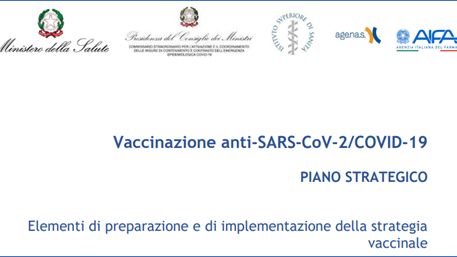SARS-CoV-2/COVID-19 Vaccination: Strategic Plan published
Pending the new National Vaccination Plan 2020-2022 which, building on the previous one, will have at its core the current health needs dictated by the COVID-19 pandemic, the Strategic Plan "SARS-CoV-2 / COVID-19 Vaccination" has been drawn up by the Italian Ministry of Health, the Extraordinary Commissioner for Emergencies, the Higher Institute of Health, the National Agency for Regional Health Services (AgeNaS) and the Italian Medicines Agency (AIFA). This plan outlines the main elements of preparation and implementation of the vaccination strategy that best meet the needs of the Italian context in order to guarantee the protection of the individual and society as a whole, thus reducing the impact of the pandemic and the related sequelae.

The spread of COVID-19 has become a real humanitarian crisis characterised by serious health, psychological and economic pressures that have highlighted the very real fragility and vulnerability of mankind and of all of the systems we rely on: institutional, cultural, political, economic, financial, scientific, health and organisational.
In order to respond promptly to the needs dictated by this serious Public Health emergency and by the health threat of international importance which we were suddenly faced with starting from January 2020, the Coalition for Epidemic Preparedness and Innovations (CEPI) an international organisation which aims to promote the development of vaccines to tackle microorganisms that cause new epidemics, has moved quickly to coordinate the development of numerous clinical trials with global health authorities in search of vaccine candidates against the SARS-CoV-2 virus. In addition therefore to discussing infection containment strategies, finding methods for identifying the positive population for COVID-19 and carrying out studies on effective therapies, in recent months, a significant part of the scientific community has worked tirelessly to develop an adequate vaccine.
To date, the availability of a safe and effective vaccine has been enabled by exploiting the knowledge about the virus made accessible to everyone extraordinarily quickly by the international scientific community’s sharing of research. This community has made use of innovative technology that has been applied in recent years in the creation of new vaccines, including modern techniques of genetic engineering and the biotechnological platforms put in place for the research on other Coronaviruses such as SARS and RNA viruses such as HIV and Ebola. The above has been made possible thanks to the extraordinary public and private resources specifically invested in this sector and, above all, thanks to the activation of rapid procedures (such as the rolling review, which consists in analysing the individual parts of the protocol as they become available from the trial, rather than waiting until the end to analyse everything together, as well as a possible fast-track) by the regulatory bodies, FDA and EMA, which have shortened the approval process.
In order to make candidate vaccine available to the public, the Ministry of Health deemed it appropriate to initiate discussions with other European partners, to proceed jointly to negotiations that could ensure the availability of a number of doses necessary and sufficient for the immunisation of citizens of the affected countries and the entire European Union.
The Strategic Plan for anti-SARS-Cov-2 vaccines, illustrated by the Minister of Health, Roberto Speranza first in the Senate and then in the Chamber, consists of eight main "axes", briefly summarised as follows:
- FREE: the vaccine will be administered free of charge to all Italians, guaranteeing, according to the principles of the Italian Constitution, the fairness of the right to health and social equality.
- NUMBER OF DOSES: Italy has optioned 202,573,000 doses of vaccines, which would represent a sufficiently large supply to potentially vaccinate the entire population and maintain safety stocks. Two doses of the vaccine will be needed, administered at a short interval of time. As regards the availability of vaccines, where all the authorisation processes are successful, Italy could be sure of the availability of the following doses:
A) AstraZeneca 40.38 million doses;
B) Johnson & Johnson 26.92 million;
C) Sanofi 40.38 million;
D) Pfeizer-BioNTech 26.92 million;
E) CureVac 30.285 million;
F) Moderna 10.768 million.
- TIMING: To present, two possible dates have been indicated for EMA authorisation: approval for the Pfizer-BioNTech vaccine could be granted by the end of the year (December 29), and approval for the Moderna vaccine is scheduled for 12 January. These two companies in the first quarter of 2021, by contract, should supply respectively 8,749,000 doses and 1,346,000 doses to Italy.
- PRIORITY GROUPS: in the initial stages, three cohorts of subjects equal to about 20 million Italians will be vaccinated as a priority. These are 1) Healthcare Workers 2) residents and staff of state-run care homes (RSA) and 3) the elderly. Vaccination will then be extended to other groups, including those working in essential services such as teachers and school staff, the police, prison staff etc.
- LOGISTICS: Aspects relating to logistics and the supply chain, storage and transport of vaccines will be the responsibility of the Extraordinary Commissioner for the implementation of the measures to contain and combat the epidemiological emergency COVID-19 of the Presidency of the Council of Ministers. As regards vaccines that require standard cold chain storage (between 2 and 8°C), a distribution model will be adopted with a national storage site and a series of territorial sites, while vaccines that need to be kept in an extreme cold chain (-20 / -70 °C) will be delivered directly by the manufacturer to 300 vaccination points in the area. Added to this is the need to provide the material deemed essential for carrying out the vaccination sessions (PPE for the personnel of the mobile units, disinfectant, plasters etc.), which the Extraordinary Commissioner will provide. The distribution of vaccines, in particular those relating to the standard cold chain, will take place with the involvement of the armed forces which, in agreement with the Extraordinary Commissioner, are already planning carriers, methods and logistics.
- INFORMATION AND COMMUNICATION SYSTEM: in order to optimise all the organisational and management processes starting from supplies, up to the planning and management of vaccination sessions, an efficient information system has been set up and interfaced with the various regional and national systems, in particular in relation to the active call/reservation system, the registration and certification of vaccination, the recall system, the timely calculation (in real time) of vaccination coverage and integration with regional and national vaccine and epidemiological surveillance systems.
As regards the aspects relating to communication with citizens, it will be necessary to proactively provide complete, objective and accurate information, with the aim of favouring a broad adhesion to the vaccination campaign by the public. To this end, a coordination unit must be identified. This will be made up ofrepresentatives of the medical-scientific world and of the institutions. Among the planned activities, priority will be given to: the development and dissemination of the key message addressed to the different age groups; updating the content spread via traditional media and via the innovative technologies provided by web 2.0 and 3.0 in order to guarantee timely and effective information/communication and, lastly, the implementation of online and offline operational strategies to detect and respond to disinformation in real time and direct any requests for information and/or advice to the website of the Ministry of Health and/or to a dedicated telephone number.
- DRUG-SURVEILLANCE: to ensure the highest level of safety during the vaccination campaign, the goal will be to provide additional surveillance on the safety of the vaccines themselves, monitoring any adverse events. Furthermore, the Italian Medicines Agency (AIFA) will launch independent studies and will avail of a specific scientific committee for the entire period of the vaccination campaign.
From the timing to the logistics, from the priority groups for immunisation to the parties involved, from communication to surveillance, the largest vaccination campaign ever carried out in Italy is ready to be put into practice.
Attached is the Strategic Plan “Vaccination against SARS-CoV-2/COVID-19". Users are invited to stay connected to our site so as to keep informed of future updates.



